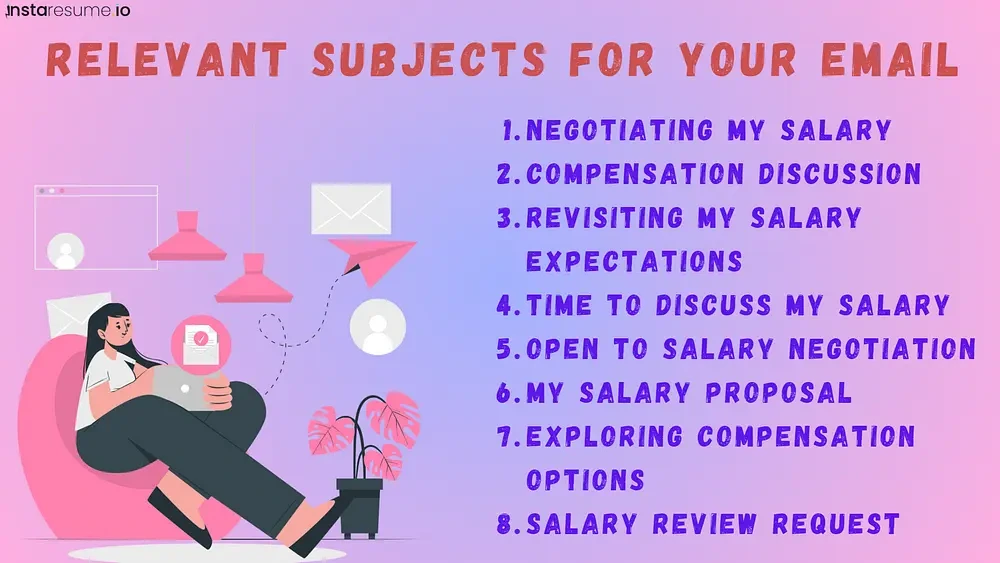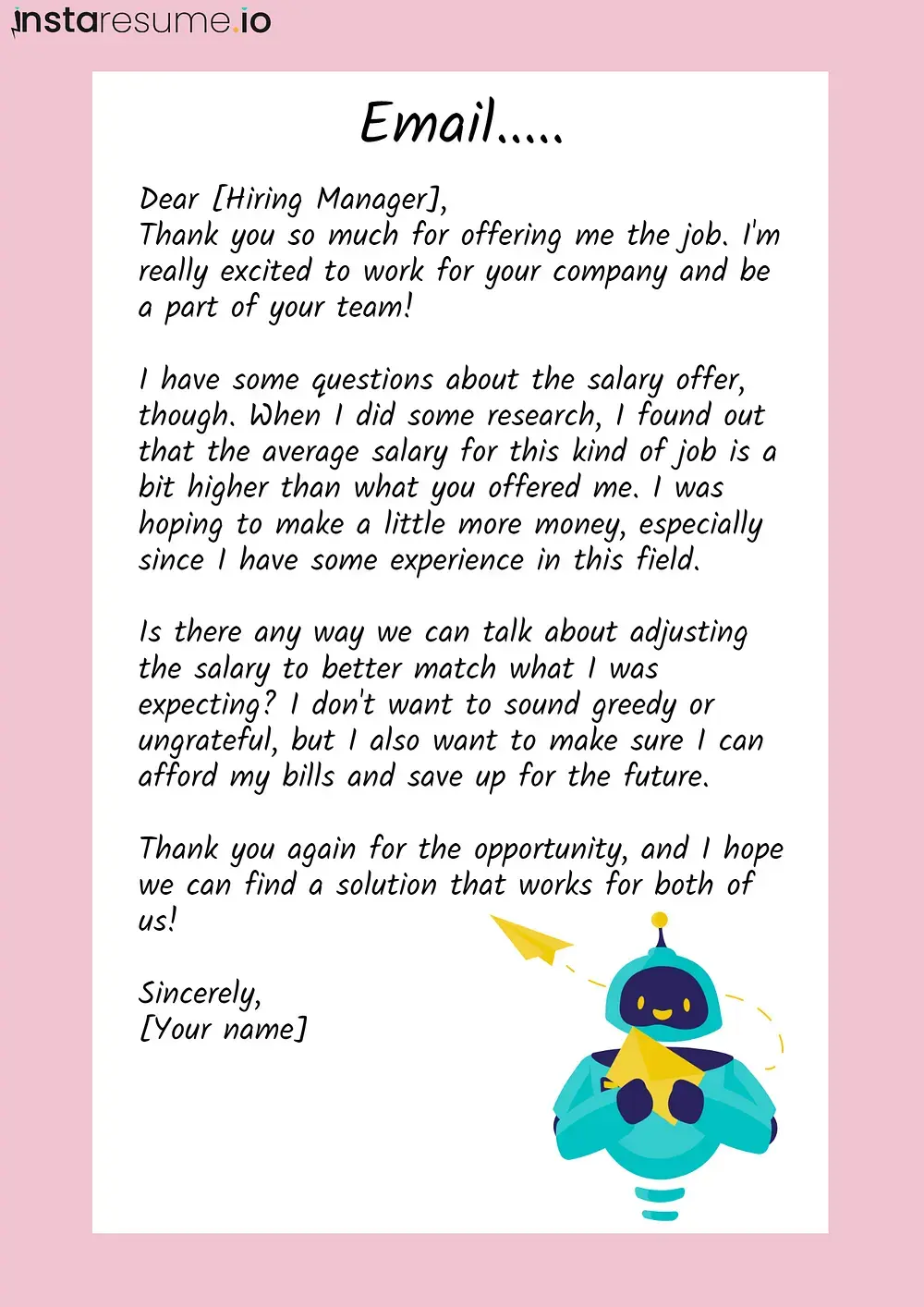How to write a salary negotiation email to Hiring Manager? 2023

Photo by Alexander Mils on Unsplash
Welcome to the world of salary negotiation, where you hold the power to shape your professional journey and secure the compensation you deserve. In this digital age, mastering the art of writing a persuasive salary negotiation email to a hiring manager is essential for maximizing your earning potential. Whether you'salary-negotiation-email or seeking a raise, this blog post will guide you through the process of crafting an effective email that leaves a lasting impression.
Why salary Negotiation is important?
Salary negotiation is a crucial aspect of your professional journey that can have a significant impact on your future opportunities and work-life balance. Let's explore why salary negotiation is important and how it can benefit you.
Better Financial Stability:
By negotiating your salary, you have the chance to secure a higher income, which can provide you with better financial stability. This means having more resources to support yourself and your family, meet your financial goals, and enjoy a comfortable lifestyle.
Recognition of Your Value:
Negotiating your salary demonstrates that you recognize your worth and the value you bring to the table. It allows you to highlight your skills, experience, and qualifications, and ensure that they are appropriately rewarded. It's an opportunity to showcase your abilities and show employers why you deserve to be compensated accordingly.
Improved Job Satisfaction:
When you negotiate your salary, you have the chance to align your compsalary-negotiation-email responsibilities and expectations. This alignment contrisalary-negotiation-email satisfaction, as you feel acknowledged and rewarded for your hard work. It creates a sense of fairness and motivates you to perform at your best.
Career Growth:
Negotiating your salary sets the foundation for future career growth. A higher starting salary or increased compensation over time can have a compounding effect on your earning potential. It positions you for promotions, salary-negotiation-email opportunities down the line. It's an investment in your long-term professional success.
Work-Life Balance:
A fair and competitive salary allows you to achieve a healthier work-life balance. It gives you the means to manage your financial commitments, enjoy leisure activities, and spend quality time with loved ones. Negotiating your salary ensures that your work is valued and that you can maintain a fulfilling personal life.
Preparing for Negotiation:
Preparing for a negotiation is essential to increase your chances of success. Here are some steps to help you get ready for your salary negotiation:
Research:
Start by gathering information about the industry standards, salary ranges for similar positions, and the company's financial health. This knowledge will give you a solid foundation to negotiate effectively.
Know Your Value:
Reflect on your skills, experience, and achievements. Understand the unique value you bring to the table and how it aligns with the position you're negotiating for. Recognizing your worth will boost your confidence during the negotiation.
Set Your Goals:
Determine your desired salary range and additional benefits that are important to you. Consider your financial needs, the market value, and your long-term career goals. Setting clear goals will help you stay focused during the negotiation process.
Practice:
Rehearse your negotiation skills with a friend or family member. Prepare responses to potential objections or counteroffers. Practicing will make you more comfortable and confident when it's time to negotiate.
Develop a Script:
Create a salary negotiation script or outline that includes key points you want to address. This will help you stay organized and ensure that you cover all the important aspects during the negotiation.
Remember, negotiation is a conversation, not a confrontation. Be respectful and professional throughout the process. Listen carefully to the other party's perspective and be open to finding a win-win solution.
What to include in salary negotiation emails?
When writing a salary negotiation email, it's important to remember that you're not just a robot asking for money — you're a real person with unique experiences and qualifications! So, don't be afraid to add a personal touch to your email.
For instance, you could start by sharing a bit about your background and why you're passionate about the industry. Or, you could mention any specific projects or accomplishments that you're particularly proud of.
You could also show your appreciation for the hiring manager's time and effort by acknowledging the hard work that goes into the hiring process. Maybe you could even include a joke or funny anecdote to lighten the mood and show that you're approachable and easy to work with.
Just remember to keep it professional and respectful, while still being true to yourself and your personality. After all, you want the hiring manager to see you as a valuable asset to the team, not just another name in a sea of applicants.
Format of your email
Here's a possible format for a salary negotiation email to a hiring manager:
Subject: Salary Negotiation for [Position Title]
#Introductory paragraph
I am thrilled tosalary-negotiation-email offer for the [Position Title] role at [Company Name]. I appreciate the opportunity to work with such a great team, and I am excited about the prospect of contributing to the success of the company.
#Main content
After reviewing salary-negotiation-email offer, I would like to discuss the possibility of negotiating the salary. While I am excited about this opportunity, I am hoping to receive a salary that is more in line with my experience and the market rate for this role.
Based on my research and experience, I would like to propose a salary of [Proposed Salary] per year. This amount better reflects the skills, experience, and value I bring to the table.
I understand that salary negotiations can be challenging, but I am confident that we can reach a mutually beneficial agreement. I am open to discussing any other benefits or perks that may be negotiable, such as [list any other benefits you may want to discuss].
#Closing paragraph
Thank you for considering my proposal, and I look forward to discussing this matter with you in more detail.
Sincerely,
[Your Name]
Subject

Relevant subjects for salary negotiation email
Remember to be polite and professional when negotiating your salary over email. Your subject line should be clear and straightforward to grab the attention of the recipient. Here are some suggestions for relevant subjects:
- Negotiating My Salary
- Compensation Discussion
- Revisiting My Salary Expectations
- Time to Discuss My Salary
- Open to Salary Negotiation
- My Salary Proposal
- Exploring Compensation Options
- Salary Review Request
Remember to be polite and avoid sounding confrontational or aggressive in your email. It's important to keep the lines of communication open and be willing to discuss a compromise that works for both parties.
Sample email
Sample :

Sample of salary negotioation email
Navigating the Negotiation Process:
Navigating the negotiation process can seem intimidating, but with some guidance, you can approach it with confidence. Here are some essential tips to help you navigate the negotiation process:
- Stay Calm and Confident: It's natural to feel nervous during a negotiation, but try to stay calm and maintain your confidence. Remember that you are advocating for yourself and your worth.
- Active Listening:Pay close attention to what the other person is saying. Listen carefully to their concerns, questions, and offers. Understanding their perspective will help you respond effectively.
- Communicate Clearly: Express your thoughts and desires clearly and respectfully. Use simple and concise language to make sure your message is understood.
- Seek Common Ground: Look for areas of agreement and mutual benefit. Finding common ground can create a positive atmosphere and help in reaching a favorable outcome for both parties.
- Be Flexible: Negotiations often involve give-and-take . Be open to compromises and alternative solutions that meet both your needs and the employer's requirements.
- Take Notes:During the negotiation, jot down important points, offers, and agreements. This will help you stay organized and ensure that you remember all the details discussed.
- Follow-Up:After the negotiation, send a polite follow-up email to thank the hiring manager for their time and reiterate your interest in the position. It shows professionalism and leaves a positive impression.
Conclusion
Congratulations! You have now equipped yourself with the knowledge and tools to write a persuasive salary negotiation email to a hiring manager. By implementing the salary negotiation tips, strategies, and techniques shared in this blog post, you are ready to take charge of your financial future and advocate for the compensation you deserve.
Remember, negotiating your salary is not a sign of greed but rather a demonstration of your value and self-worth. With each negotiation, you are building your confidence and refining your negotiation skills, which will serve you well throughout your career.
As you embark on your salary negotiation journey, keep in mind the importance of thorough research, effective communication, and maintaining a professional and respectful tone. Tailor your negotiation approach to each specific situation, considering the company culture, industry standards, and your own qualifications.
While the negotiation process may sometimes be challenging or met with resistance, stay persistent and focused on achieving a mutually beneficial agreement. Keep the lines of communication open, listen actively, and be willing to explore alternative solutions.
Lastly, remember that negotiation is not limited to salary alone. It extends to other aspects such as benefits, compensation packages, starting salary, and freelance rates. Leverage the negotiation script and email templates provided to streamline your communication and make a compelling case.
Now, armed with this comprehensive salary negotiation guide, it's time for you to unleash your potential and pave the way for a more rewarding and fulfilling professional journey. Best of luck in your negotiations, and may you secure the compensation and opportunities that align with your aspirations and value.
Empower yourself, embrace the negotiation process, and step confidently into a brighter and more prosperous future!

